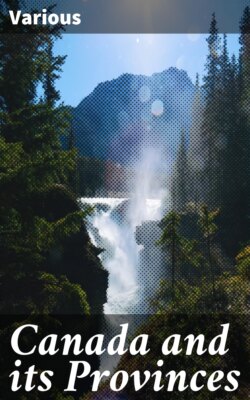Читать книгу Canada and its Provinces - Various - Страница 7
На сайте Литреса книга снята с продажи.
Social and Political Conditions
ОглавлениеTable of Contents
On October 19, 1839, Charles Edward Poulett Thomson[1] landed at Quebec to assume supreme authority in British North America, and the date may well be considered that from which to count the founding of modern Canada. For political and social progress demands a certain foundation in organized institutions, and political order was the chief gift which Sydenham had to bestow on a land where society was still in a state of chaos.
It is impossible to deal with Canada at this period in the grand style, for she had barely yet escaped from the sordid and harsh essentials of the struggle for corporate existence. One has only to dip into the material clustering round Durham’s Report to gauge the immaturity of society and politics in the provinces on the eve of Sydenham’s government. Here and there growing cities, from Quebec and Montreal to Toronto, gave promise of a great future, and formed rallying points for Canadian culture; but true municipal and local government had not yet come into being, and regulations, where they existed, often existed only to be abused. Outside the cities there was a confused and sometimes painful process of land settlement wherein the most hopeful feature was the rough selection of the fittest made by the struggle for existence, from which there seemed likely to emerge a hardy generation with more leisure than their fathers to devote to higher forms of communal life.
Education, so far as the masses were concerned, was seriously defective. In the cities schools of no inconsiderable merit had been organized, and in Lower Canada the church had her own educational policy. Nevertheless, there were districts where the proportion of children attending school was one in twelve and where the schoolmaster’s earnings amounted to a poor £20 a year.[2] Medical knowledge was naturally irregular in its distribution, and country doctors were known to have acquired a quick and easy professional training across the border in three months; and the treatment of the sick, the insane and the criminal demanded radical reformation.
Where the common facts of life were so ill-ordered it was hardly likely that political methods would be sound. Among the United Empire Loyalists there were men whom not even their prejudices could rob of a clear title to statesmanship, while Robert Baldwin in Upper Canada and Louis Hippolyte La Fontaine in Lower Canada proved that agitation was educating true constitutional leaders. Nevertheless, the Canadas were spending too much of their energy on mere friction, and it was the unanimous verdict of cool contemporary observers that Canadian politics consisted too largely of fierce but petty party warfare, the pursuit of private and corrupt ends, and of administrative methods which Sydenham could only designate ‘the present abominable system of government.’ Up to the year of the Union the true leaders of Canada, and the only men with a gleam about them of that romance with which the earlier history of Canada is so full, were the settlers before whom the forests were retreating, the engineers who were improving Canadian waterways, and the pioneers in inland and oceanic navigation.
It lies beyond the scope of this chapter to deal with the abnormal conditions created by the Rebellion, but it must be recognized that race hatred and division were perhaps the most powerful foes that civilization had to face, and that the political confusion in which the rising found its opportunity set this ‘maker’ of Canada the task not only of creating a sound government, but of educating men to work that government. Nothing astonishes the reader of Sydenham’s dispatches so much as the ignorance of the very fundamentals of parliamentary government displayed by men who were agitating for more control of affairs by themselves. ‘When they come to their own affairs,’ he said in two vivid sentences, ‘and above all to the money matters, there is a scene of confusion and riot, of which no one in England can have any idea. Every man proposes a vote for his own job; and bills are introduced without notice, and carried through all their stages in a quarter of an hour.’
To make Canada, it was not merely necessary, in 1839, to create a Union and to quench the last sparks of rebellion. Facts called for a reorganization of society: the creation of a sound educational system; the pacification of warring churches; the cleansing and rationalizing of mistaken methods in land-granting; some attempt at least to grapple with the errors of existing immigration. Above all else a scheme of government had to be created which, while it offered the full advantage of constitutionalism to Canadian citizens, should first fit them for their rights by teaching them their responsibilities. The work could be accomplished perfectly only after a generation had passed, and even then there remained vast tracts of political ‘wild land’; but the man who first made it certain that there was to be government, and not anarchy, was Poulett Thomson, one of those many servants of the Empire whom Britain finds it so easy to forget, and concerning whom Canada herself was, until recently, somewhat indifferent.
| [1] | He became Baron Sydenham of Sydenham and Toronto on August 19, 1840. |
| [2] | ‘A common farm servant,’ says the Rev. Mr Alexander of Leeds in his evidence before a committee of the House of Assembly in 1836, ‘is allowed £15 per annum for wages, and, in addition, washing, board and lodging. A schoolmaster rarely gets more than £20 per annum, and none of the above-mentioned extras.’—Lord Durham’s Report, Appendix D. |
